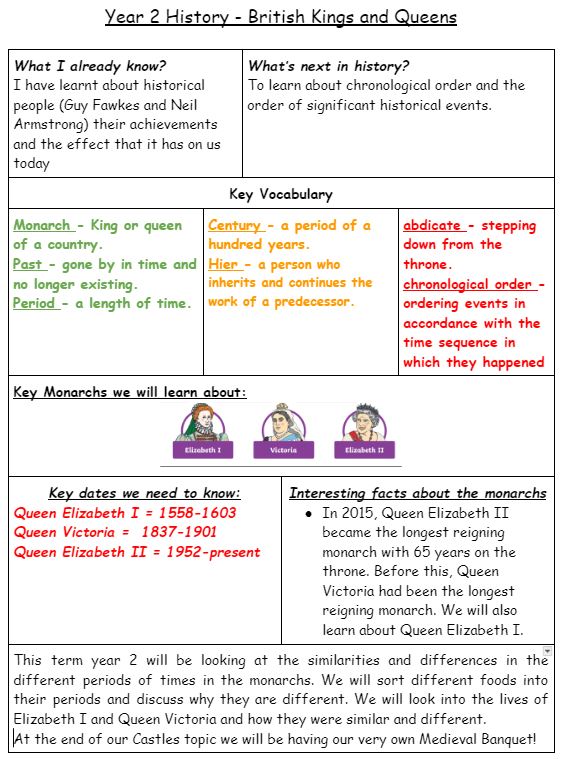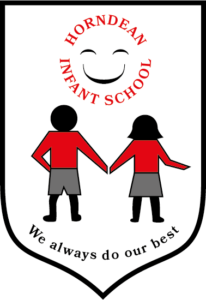History
History within the Early Years Curriculum
Within ‘Understanding the world’, the Early Learning Goal (ELG) entitled ‘Past and Present’ provides opportunities for teaching and learning about the past in preparation for more formal study of History in Key stage One. At Horndean we do this through:
Encouraging children to talk about members of their immediate family and community – During dedicated talk time, children talk about their family and listen to others share information about their own. They have opportunities to ask questions or make comments. Using examples from real life (family photos) and from books, children develop an understanding of how there are many different families.
Naming and describing people who are familiar to them – Children talk about people that the children may have come across within their community, such as the police, the fire service, doctors and teachers. Children discuss their own experiences with people who are familiar to them.
Commenting on images of familiar situations in the past – Children explore and engage with pictures, stories, artefacts and accounts from the past, explaining similarities and differences. They have hands-on experiences that deepen children’s understanding, such as visiting a local area (Horndean village). Children look closely at images of familiar situations in the past, such as homes, schools, transport and toys. Supporting adults encourage children to talk about experiences that are familiar to them and how these may have differed in the past. Children begin to organise events using basic chronology, recognising that things happened before they were born.
Comparing and contrasting characters from stories including figures from the past – Frequent sharing of texts, images, and storytelling helps children begin to develop an understanding of the past and present. There are opportunities to explore common themes from stories, such as bravery, difficult choices and kindness, and for children to talk about their experiences with these themes. In addition to storytelling, children are introduced to characters, including those from the past, using songs, poems, puppets, role play and other storytelling methods.
| Topic | Intent (Why?) | Intervention (What?) | Impact (How?) |
|
The Great Fire of London (Year 1) |
Children will develop an understanding of a national event that has happened beyond their living memory. They will begin to understand the importance of history on us. |
Role play event Hot seating – Ask and answer questions of people that were there. Recount the event as if they were there (5 senses) Set fire to houses |
Memorable experience First hand experience which is exciting and engaging Children able to talk about a historical event in order begin to how history is impacts the future (fire service) |
|
Florence Nightingale (Year 1) |
Children develop an understanding of how people’s lives have shaped this nation. |
Hot seating, role play and dress up. Prep – Who Florence was Factual writing on the impact she had and who she was. Workshop to immerse in what it was like. |
Memorable experience First hand experience – people’s feelings Children are able to understand what it would have been like in that time and how people can impact the future. |
|
Amelia Earhart (Year 1) |
Children develop an understanding of how people’s lives have shaped us internationally. |
Hot seating, role play and dress up. Prep – Who Amelia was Factual writing on the impact she had and who she was. Dress up day or explorers |
Children will begin to understand why she is an important part of history and impact she’s had in the world today. |
|
Castles (Kings and Queens of the past) (Year 2) |
Verbalise how the past has had an impact on how we live today |
Trips to different castles (Southsea/Portchester) Comparative writing on the defences used in castles Visiting Knight – discussing castles life and kings and Queens of the time. Develop language of castles and their defensives. Identify the Kings and queens from the past Banquet – Relive the life of the past and how it’s different to now. |
Children can verbalise the importance of castles in the past and use vocabulary to support this. They will be able to discuss differences between now and then and how Kings and Queens have changed over time. |
|
Guy Fawkes (Year 2) |
Verbalise ways in which we find out about the past and identify different ways in which it is represented. (Evidence/different sources) |
Prep Drama – Freeze frames and acting out event. Writing of the retelling of the event in detail Cross curricular – P4C – conversations about moral and choices. Dress up day |
Children understand how the past has an impact on the future. They will have developed knowledge in how reliable evidence is in History and the importance of it to prove events happened. Children will form an opinion and become more independent in asking and answering questions based on their knowledge of the event and sources. |
|
Remembrance (Year 2) |
Be able to understand and verbalise the importance of historical events and the impact they have on us today. |
Poems Design and make own poppies Exhibition of art work and poems for parents and staff to view |
Children understand the importance of remembering soldiers and the war. |
|
Man on the Moon (Year 2) |
Children need to deepen their knowledge and skills taught in year one of how people’s lives have shaped us internationally. They need to show evidence and verbalise how they know this person have impacted on us and how much of an impact it has had. |
Video hook of the moon landing Drama – role play events Retelling the event in order Debating how they know this event happened and proving this through range of sources Planetarium – disc |
Children will begin to see the impact taking risks can have in history and how you can discover things by this. They will gain the knowledge needed to research further into people in history (Related to Florence Nightingale and Christopher Columbus) |

